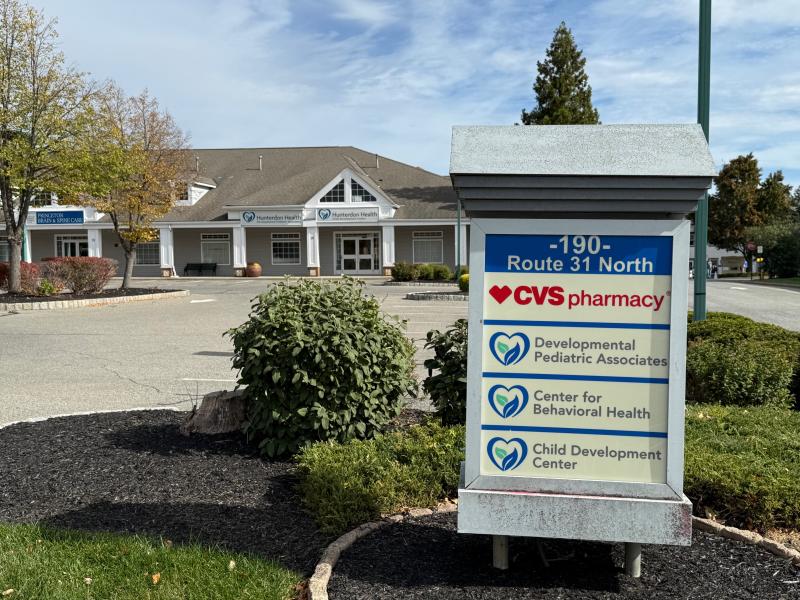
Early Intervention Program
Early Intervention Program
The Early Intervention Program is a family-centered program for developmentally delayed children from birth to age three. Parents are an important part of the total program which includes a developmental evaluation to determine eligibility for the program. Individual sessions are in the child’s natural environment, mostly the child’s home. The core team of professionals may include a special education teacher, speech-language pathologist, occupational therapist, and/or physical therapist. The team works with families and children to improve developmental skills in the areas of motor abilities, self-care, play skills, communication, and socialization.
Early intervention services are funded in part by a grant from the New Jersey State Department of Health and Senior Services-Early Intervention Program and by Hunterdon Medical Center.
For more information call Service Coordinator:
Linda O’Brien, RN, MSN (908) 788-6398 or to refer your child call (888) 653-4463.
Further information can be found on the NJ Department of Health Website.
Service Coordinator
Your Service Coordinator is named in your Individual Family Service Plan (IFSP) to help you coordinate early intervention services. Your Service Coordinator also will work with you to help arrange services in your IFSP and become familiar with the Early Intervention system of services.
In New Jersey, Service Coordinators work through the Special Child Health Services Case Management Unit in each county.
The term “single point of entry” has been assigned to these units, since they serve as a family’s “door” to the early intervention service system.
Families can call a Service Coordinator when they receive a diagnosis that their child has a developmental delay or disability – or if they suspect that there is a delay.
Each family has its own Service Coordinator who will have ongoing contact with them. It is the responsibility of the Service Coordinator to:
- Arrange for an evaluation and assessment of each child
- Take part in developing the IFSP, and help review and evaluate it
- Assist families in identifying and arranging available services
- Coordinate and monitor the delivery of available services
- Inform families of the availability of advocacy services
- Coordinate services with medical and health providers
- Help develop a transition plan to preschool or alternative services
Infants and toddlers with developmental delays are treated as part of the family system. The relationship your family has with your Service Coordinator is critical. Your partnership is a key component in a successful, family-centered experience.
FAQs
The federal law that governs Early Intervention (Part C of the Individuals with Disabilities Act) states that the intent of Early Intervention is to enhance the family’s capacity to meet their child’s needs. A TRANSDISCIPLINARY Approach to Early Intervention has been found to be very effective in working with young children and their families.
The TRANSDISCIPLINARY Approach is designed to combine the knowledge you have about your child as his/her parent/guardian, with the expertise of the rest of the Early Intervention team to improve services for you and your child.
- Parents/guardians, primary service providers, and other trained professionals – who are consulted when needed – form the Early Intervention Team. When using a TRANSDISCIPLINARY Approach, there is usually one primary person (the primary service provider) who works with the child and family on a regular basis.
- The primary service provider working with you and your child has been trained as an Occupational Therapist, Physical Therapist, Speech-Language Pathologist, Social Worker, Nurse or Special Educator. This individual has experience, skills, and knowledge about overall development. The primary service provider is qualified to help your child in all areas of his/her growth and development, including the following skills:
- Gross Motor Skills – Large body movements such as crawling, walking and jumping.
- Fine Motor Skills – Small body movements such as using one’s hands to hold a rattle, a spoon, or do a puzzle.
- Communication, speech, and language – Understanding what is said, following directions, and making needs known.
- Sensory – Receiving and using information through touch, hearing, and sight.
- Social and Emotional Development – Interaction with other children, adults, and the environment.
- Cognitive – Thinking and learning.
- Adaptive, self-help skills -Ability to perform daily living skills appropriate to the child’s age such as feeding him/herself
- The primary service provider also has available a team of other professionals who can be called upon to discuss your child’s developmental progress and appropriate services when needed.
- A TRANSDISCIPLINARY team works with you to develop an Individualized Family Service Plan (IFSP) that includes the goals (outcomes) you envision for your child and family, and shares in the responsibility of helping your child to develop to his/her greatest potential.
- As changes are needed or new concerns come up, you and your primary service provider can consult with other team members to adjust or change the IFSP goals (outcomes).
- The most important people helping your child’s growth and development are his/her family. Your primary service provider will also help consult and work with you in carrying out the plan that is developed for your child and family.
- By using a TRANSDISCIPLINARY Approach, the Early Intervention Team coaches families for success. This means that your primary service provider will give you ideas and strategies to use with your child every day – even when (s)he is not there. For example, if your primary service provider works with you and your child on feeding issues one time a week, (s)he will give you ideas about how to incorporate strategies into all the meals you feed your child.
- The most important part of a TRANSDISCIPLINARY Approach is developing strong, supportive relationships between families and early intervention providers. By using a TRANSDISCIPLINARY Approach, one primary person – the primary service provider – focuses on forming this relationship with you and your child. In this way (s)he has an opportunity to get to know your child and family, and can better monitor any changes and needs.
- By using a TRANSDISCIPLINARY Approach, the primary service provider works with you on all areas of your child’s development through play and daily activities.
- Your primary service provider will work with your family to develop skills that will help your child’s development. (S)he will answer questions, model activities, and offer creative suggestions your family can use in your daily life.
- Your primary service provider and other trained professionals will work with you to provide ongoing assessments and will complete periodic and annual reviews of your IFSP. This will allow you and your primary service provider to monitor your child’s progress and make changes to your plan when needed.
- Your service coordinator (at Special Child Health Services) is responsible for ensuring that all appropriate services are available. (S)he can also assist in locating any necessary additional resources and services.
Research tells us that…
- Parents’ learning is more effective when the therapist demonstrates less for parents and uses a coaching model instead (Van Horn, 1997).
- Parental views, expectations, and knowledge about their children are central to the planning and implementation of intervention (Weston, lvins, Heffron, & Sweet, 1997).
- The focus on relationships points out that the way in which services are delivered is as important as the actual service itself (Seitz & Provence, 1990).
- Job-role expectations for people who work in Early Intervention are expanded beyond discipline-specific tasks to include talking with parents about their perceptions, feelings, and immediate needs. Developing an understanding of the parent’s perception of the child is part of working with the parent and child together (Weston, lvins, Heffron, & Sweet, 1997).
- There are four assumptions that govern the transdisciplinary team model:
- Natural environments are the best place to assess and develop children’s abilities.
- Children should be taught clusters of skills needed for everyday living. These skills are best taught through natural routines and activities.
- Discipline-specific goals and objectives should be implemented throughout the day and in all settings in which the child functions.
- Skills must be taught and reinforced in the settings in which they naturally occur. (Orelove & Sobsey, 1991)
- The following outcomes have been associated with services provided in natural environments:
- Services are more likely to reflect the family’s normal routine and thus are more convenient for families.
- Services are more likely to enhance the family’s capacity to work with their own child to help maximize their development.
- Research has demonstrated that children served in natural environments progress as well as children serviced in segregated settings, and are more likely to transfer, or use, the skills they learn to other situations. (Bruder, 1998; Brown, Horn, Huser, & Odom, 1996; Bruder, 1993a; Buysse & Bailey, 1993, 1993; Fox & Hanline, 1993; Lamorey & Bricker, 1993; McLean & Hanline, 1990)
- Research has also shown that children served in natural environments prior to entering public schools are far more likely to start their school career in integrated settings – and remain in those settings for their entire school experience.
- Services in natural environments are more likely to result in the child becoming an accepted member of the larger community.
The Family Support Guide is sponsored by the Central New Jersey Maternal and Child Health Consortium, Inc. and funded by the New Jersey Department of Health and Senior Services Early Intervention Program, with funds from Part C of the Individuals with Disabilities Act (IDEA).

